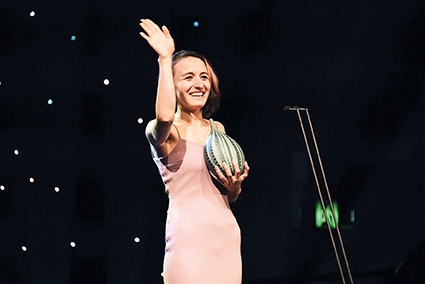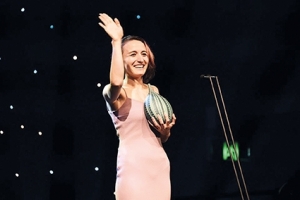Georgian Film Director Mariam Khachvani on her Latest Success: Dede
Exclusive Interview
Svaneti, Georgia’s historic and remote region, also coined as “paradise on earth”, is again in the spotlight of global attention. This time the reason for the increasing popularity of Svaneti, its nature and culture, is young Georgian director Mariam Khachvani. Her award-winning film Dede, having been screened at various international film festivals already, is based on real stories, showcasing Georgia’s mountainous region which is governed by harsh traditions, where customs and fundamental human rights collide. Dede (mother in Svan language) tells the story of a local girl, Dina, who is forced to marry a man she does not love and who has to overcome many obstacles for her happiness. Mariam’s first feature film evolves not only around a tragic love story but also highlights the unique and thrilling landscape of Svaneti, as well as giving a glimpse into ancient customs and rules locals still follow. The author of the film was brought up in Svaneti’s Ushguli village, which is the highest inhabited place in Europe, so she made the film as authentic as possible.
GEORGIA TODAY talked to Mariam Khachvani, the director and the scriptwriter of Dede, to discover more about the film.
Tell us which awards Dede has received
The film has claimed a number of international awards. The film earned its very first award Special Jury Prize for the East of the West competition section at the Karlovy Vary International Film Festival, then received the Grand Prix at the AFF Avvantura Film Festival in Croartia, that was a really big achievement since the main member of the jury was the chief selector at the Cannes Festival. Later, at the Batumi Film Festival, I was given the Jury Prize followed by a Silver Angel for Best Director at TOFIFEST. Dede also won the Cinemed in Montpellier which is the second largest French film festival after Cannes, where I received the People's Award. Then I was granted the President’s Prize and Production Prize at the Fort Lauderdale International Film Festival in the US. Most importantly, Dede won the Grand Prix of Jury at the 30th meeting of the Cannes International Film Festival, where best European films of the year were selected. The films in the section were the winners of different international festivals such as Berlinale, Locarno and, to my surprise, Dede was selected by the jury and won the main prize. Then came the Asian Oscars in Australia where my film was given the Cultural Diversity Award under the patronage of UNESCO.
You were named among the six best directors at Cannes and in March you are invited to work on your new script in Paris. Could you elaborate on that?
The Cannes Film Festival offers a special program within the frames of which six directors are selected. These directors are invited to Paris, where they are provided with residency and are able to work on their new scripts. I am fortunate enough to be one of them and to work on my new feature Nene in the Cinefondation Residence program of the festival starting in March. I will get to learn French and meet famous figures from the movie industry together with other selected filmmakers. Although my film attracted massive interest from the international audience, especially French people, I was still surprised that I was named among six best directors. The script for my new film was not fully developed back then, it was only in the first stage of its development, and the fact that it impressed the jury excited me a lot. Additionally, at the Asian Oscars in Australia my new project Nene claimed another award, in particular a special grant for developing the script, which also came as a surprise. As the jury told me, they received around 200 projects, yet they were attracted by my script, style and vision.
What is the main message of the film Dede?
I've always been against restricting someone’s freedom. It does not matter in what form a person’s rights are violated, be it through traditions, culture, etc. So I tried to stay objective towards all cases. My aim was to show the people their reflections through this movie and not through invented characters. The film reveals both bad sides and good sides of society as well as depicts the customs they follow. For instance, my favorite tradition is the ritual of inviting the souls of the deceased, which is shown in my film. I don’t want this unique tradition to fade away, so through my work I expressed my respect toward such beautiful customs. Since many old traditions are disappearing over time, I hope my film will serve as a heritage or archive for future generations who will be interested in Svaneti and its culture.
Where did you draw inspiration?
I drew inspiration from my previous short film Dinola, shot based on real stories my grandmother used to tell me. These stories depict the way people used to live in Svaneti. I was affected by the fact that so many families were created without love. I was really hurt by these sad stories and felt sorry for women in such wedlock. Maybe someone might think there is too much drama in the film, but in fact, I did not invent this drama by myself: I only gave insight into the reality and, to be honest, there are many such tragic cases in the region and many Svan people can confirm it. Yet, nowadays the situation has slightly changed, and some traditions have transformed. The reason for this transformation is that tourism has developed in the region and people are starting to think in different way. I think the customs that violate human rights, such as kidnapping and marrying by force, should be abolished, while those rituals that express love and friendship should be maintained. As for the shooting process, working on the film was quite difficult due to the severe climatic conditions. There were days when we had to work in freezing weather and sometimes at minus 40 degrees, yet it was worth it. The shootings started in 2016 and finished in 2017. Svaneti is characterized by harsh weather conditions yet it is as beautiful as paradise.
The film has already been premiered in Georgia’s cinemas. How has the Georgian audience reacted?
I did not expect Georgian spectators to like this film to such an extent, since, as a rule, Georgians are too demanding and like criticizing. The film received a lot of positive feedback from Svans and others. Most who had already seen the movie expressed willingness to watch it again. I also plan to organize a screening of Dede for locals in summer in Ushguli and Mestia where the shootings took place.
Lika Chigladze











